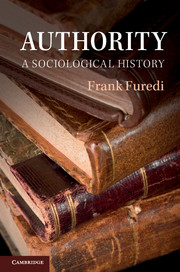Book contents
- Frontmatter
- Contents
- Preface
- Introduction: always in question
- 1 Thersites and the personification of anti-authority
- 2 Socrates and the quest for authority
- 3 Rome and the founding of authority
- 4 Augustus: a role model for authority through the ages
- 5 Medieval authority and the Investiture Contest
- 6 Medieval claim-making and the sociology of tradition
- 7 Reformation and the emergence of the problem of order
- 8 Hobbes and the problem of order
- 9 The rationalisation of authority
- 10 The limits of the authority of the rational
- 11 Taming public opinion and the quest for authority
- 12 Nineteenth-century authority on the defensive
- 13 Authority transformed into sociology's cause
- 14 The rise of negative theories of authority
- 15 By passing authority through the rationalisation of persuasion
- 16 In the shadow of authoritarianism
- Conclusion: final thoughts
- Bibliography
- Index
9 - The rationalisation of authority
Published online by Cambridge University Press: 05 June 2014
- Frontmatter
- Contents
- Preface
- Introduction: always in question
- 1 Thersites and the personification of anti-authority
- 2 Socrates and the quest for authority
- 3 Rome and the founding of authority
- 4 Augustus: a role model for authority through the ages
- 5 Medieval authority and the Investiture Contest
- 6 Medieval claim-making and the sociology of tradition
- 7 Reformation and the emergence of the problem of order
- 8 Hobbes and the problem of order
- 9 The rationalisation of authority
- 10 The limits of the authority of the rational
- 11 Taming public opinion and the quest for authority
- 12 Nineteenth-century authority on the defensive
- 13 Authority transformed into sociology's cause
- 14 The rise of negative theories of authority
- 15 By passing authority through the rationalisation of persuasion
- 16 In the shadow of authoritarianism
- Conclusion: final thoughts
- Bibliography
- Index
Summary
Hobbes sought to address the problem of order through reconciling the aspiration for individual liberty with the reality of absolutist rule. Despite his realistic advocacy of absolutist sovereignty, his recognition of the natural liberty of the individual situates him as one of the key influences on modern liberalism. Hobbes grasped that in his time, competing versions of authority made the task of gaining consensus about its meaning problematic. He provided a very early account of the threat that dissident intellectuals and ideologically inspired religious groups could represent to the maintenance of order, and in this sense his criticism of the role of intellectuals and universities during the English Civil War anticipated the subsequent tendency to blame the philosophes and other intellectuals for the breakdown of authority in the eighteenth and nineteenth centuries.
One of the unique features of Hobbes's political philosophy was its realistic representation of domination and authority as the accomplishment of the political will. Although Hobbes was conscious of the need to ensure that his Leviathan provided security and order for individuals and their property, his absolutist emphasis was not quite congruent with the demands of the rapidly expanding commercial society. The modernising economies of Europe required new freedoms for the pursuit of commerce and trade and its advocates demanded restraints on the activities of the state.
- Type
- Chapter
- Information
- AuthorityA Sociological History, pp. 206 - 228Publisher: Cambridge University PressPrint publication year: 2013



